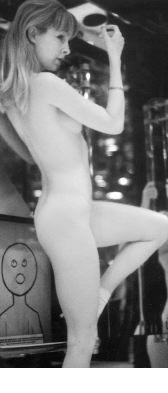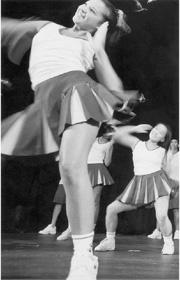YOU CAN’T ACCUSE Julia Query of staying perched in the ivory tower. A former graduate student who wrote on the sex industry, Query subsequently immersed herself in the object of her studies: She became an exotic dancer at a San Francisco men’s club and later spearheaded the country’s first labor union of strippers. Nude Girls is Query’s account of the union’s struggles between 1996 and 1998, but it’s also a deeply personal story about the choices she has made in her career. Like the recent documentaries Sex: The Annabel Chong Story and The Girl Next Door, Nude Girls fuels the ongoing feminist debate about women working in pornography.
LIVE NUDE GIRLS UNITE
directed by Julia Query and Vicky Funari runs November 24-30 at Varsity
Why would a highly educated person become a stripper? Well, aside from the money and flexible hours, Query says, “[I’ve] never worked with so many women with college degrees, mostly in women’s studies and philosophy. It’s like they figured out what to do with patriarchy—take their money.” Another stripper cites the thankless job prospects faced by conventionally attired liberal arts grads: “I was finally being paid for what I was worth,” she says.
Still, for all the monetary rewards of taking off one’s clothes, working conditions are pretty poor. Strippers have no health insurance, no sick days, and are classified according to race and breast size. At Query’s club, where women dance in a mirrored room for voyeurs, the blonde and busty are given preference for more lucrative private lap dances. (The union demands banishment of this bias and wins.)
Despite her union successes, the conflicted Query keeps her profession and activism a secret from her mother, Dr. Joyce Wallace, a prominent physician known for her outreach to prostitutes. At first, mother and daughter seem very close—Query talks about looking up to her liberal activist mom and growing up want-ing to “fight the good fight.” Yet the paradoxes of this relationship provide the most surprising—and painful—aspect to Query’s story. When she finally fesses up to Mom, she’s rejected outright. Dr. Wallace becomes so upset that she breaks off communication between them. This mother hates the idea of her daughter being a willing participant in an industry she considers demeaning (and she could be right).
Given this rift, Nude Girls sides with the child, a new-school feminist whose supposed triumphs—like those of gang-bang self-promoter Annabel Chong—require validation through media exhibitionism. Clearly, Query, who remains a stripper to this day, may have won the fight for fellow dancers, but her bigger challenges lie ahead.







